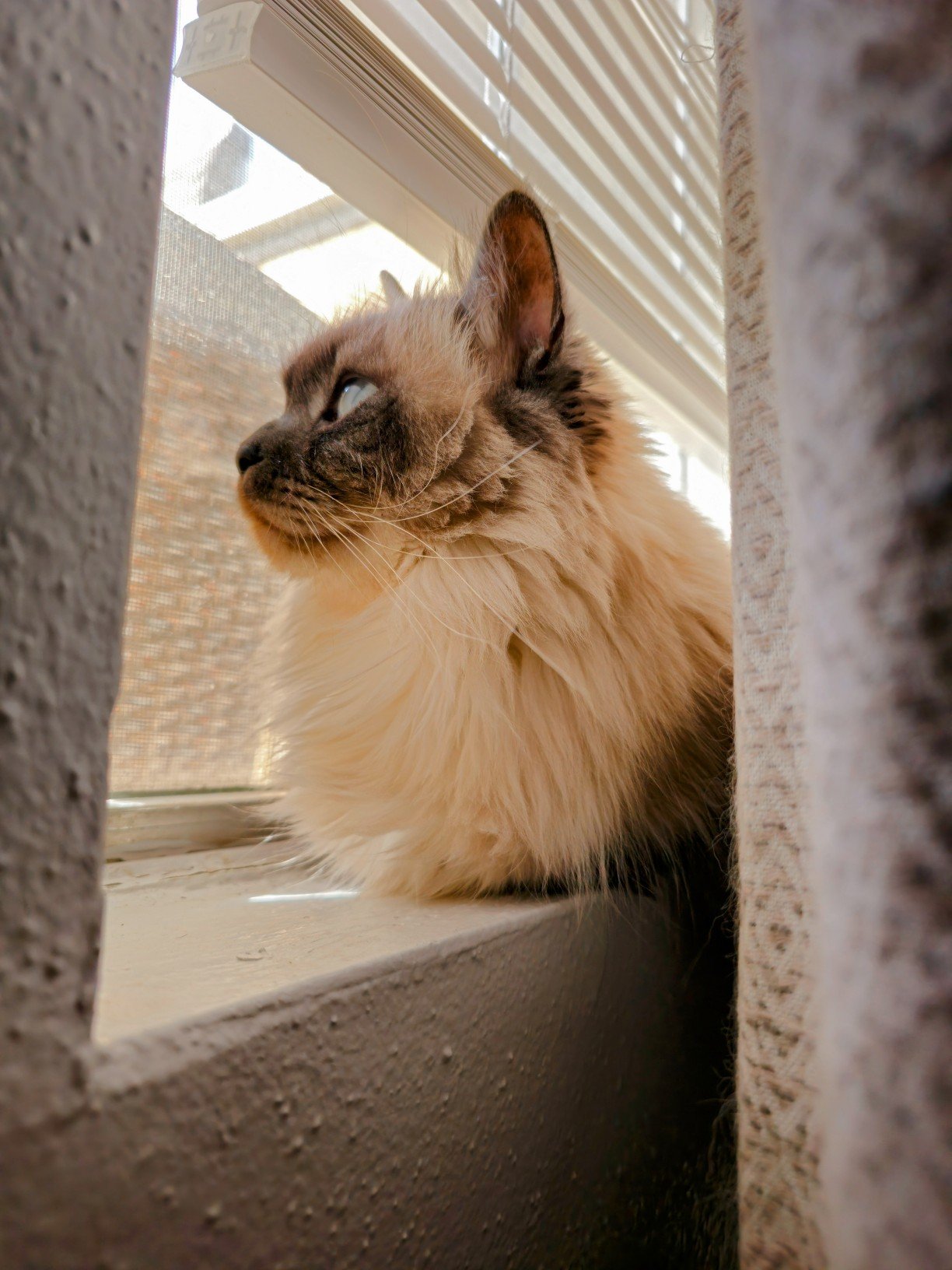My lower res, lower DPI display from my old Dell laptop looks much more sharp and crisp than the fancy pants Framework 13 high res display.
Yeah totally the customer’s fault for wanting a nice display in friggin 2024, certainly not the software’s which still has no proper support for it.
Exactly! All I want is a nice display in 2024—and Framework chooses a garbage display with known issues.
No, YOU chose the software with known issues.
Discord, Spotify and other electron applications will work fine in a browser. Rather than installing packages that are causing you issues just run them in Firefox.
It’s not a hardware issue but a combination of software issues.
Let me guess… You’re running an X.Org based WM/DE?
X11 Doesn’t support fractional scaling properly . So some DEs will simulate it by scaling the apps the same way you scale a rasterized image like a PNG or JPEG, and as a result everything looks blurry. You’ll generally also have the same issue with XWayland apps on a Wayland display.
The best way to combat this? Try to use Wayland native apps as much as possible.
2nd best? Use non fractional values for scaling (x1 or x2 instead of x1.25)
You can also adjust the x dpi with .xresources, but switching to wayland is the better solution
Doesn’t Gnome ignore dpi in .Xresources in favor of its own hardcoded dpi?
Idk, I don’t use gnome
Probably, since GNOME is a poorly written piece of shit
So some DEs will simulate it by scaling the apps the same way you scale a rasterized image like a PNG or JPEG
So in the end they DO fractional scaling
Let me guess… You’re running an X.Org based WM/DE?
Na, using Wayland with Gnome 45. 1.25x scale actually looks less blurry than 2x. (Putting aside that 2x is ridiculously large.)
The best way to combat this?
Is to buy a laptop with a regular DPI display and avoid this class of bugs altogether. This way I can keep using Discord and 1Password.
Also kde is way better about this than gnome. Especially kde 6.
Discord is blurry because it’s an electron app, and electron isn’t native Wayland. You can make it work with
--enable-features=UseOzonePlatform --ozone-platform=waylandTIL
KDE and Qt have much better fractional scaling right now. GTK won’t implement it until a much farther release
Man, I just installed debian 12 with wayland (Gnome or KDE can’t remember) to play around and get instant headache from blurry fonts with my 1440p display with no scaling (Firefox and settings window are blurry af). No clue how to fix it, tried out few of the things I found online and none of them works.
Next plan is to try another distro and hope for the best.
Just a shot in the dark, but have you logged out and back in at any point?
Some settings can’t be applied in a running session.Yeah and rebooted but it didn’t help. The settings window did state that some settings require reboot / relogging.
If I keep having the issue after reinstall I’ll make a new thread about it and maybe get some new ideas.
Probably GNOME. The new font rendering is dog shit although it’s supposedly getting better.
Could be, I’ll try out something else (KDE probably) next time!
Interesting, if it’s a native Wayland app, I’d guess the issue is just gnome problems then - from what I hear gnome is one of the poorest DEs for Wayland use, mainly because they refuse to support things the same way that everyone else agrees to, if at all. And they take a fair amount longer to deliberate and agree how to implement anything they do decide to support.
I’d think of looking at KDE, which is very functional at this point, or a wlroots based Compositor/WM, - hyprland seems like one of the more well supported window managers out of the ones using wlroots.
Gnome was the first popular DE to have reasonable Wayland support and Fedora has switched to it by default for literal years now. I don’t know where you get your info from, that Gnome is “one of the poorest DEs for Wayland use”, but it certainly isn’t from me (and I’ve actually used Gnome on Wayland since before it was the default in Fedora Workstation).
I am using Gnome with Wayland and a 1440p display, and it seems to work surprisingly well. Or maybe I jut got used to dealing with the problems, and would be surprised at how well things work under a different DE.
Do you remember making any tweaks? I had Debian 12 with Gnome and could not figure out how to fix blurred fonts with 1440p display.
Xwayland apps (running in legacy xorg) are extremely blurry under fractional scaling, native wayland apps can have worse rendering but not very noticeable.
The easiest way of checking if you have doubts is install xeyes and launch it. if xeyes follows the cursor inside the app you are tesing is in xwayland, if not is pure wayland.
Electron apps have to be configured to use wayland, whereas If you are in Debian check Firefox (ESR) is using wayland or install it through the offical deb repo of mozilla the latest. I think in the archwiki are the envronment variables to check.
And, for 125% maybe is just worth to you to just scale text to 1.20 using gnome-tweaks and leave it at 100% the scaling. It is not fancy, but it works. I have to use 150% so is too obvious/ugly to just scale the fonts…
Yeah I’ve heard that xwayland is not great. But I did not have any factorial scaling, just normal 100%, nevertheless I did test esr and the standard one, though the standard is definitely a flatpack. Also just the text on the settings window was blurry so I don’t think that was the issue.
I’m on opensuse tumbleweed. It might just be that all the apps I use are Wayland. I’ll take a look when I’m back home, currently I’m on a trip visiting family.
Thanks!
2x being “ridiculously large” is the same as as 1080p display genius.
Is to buy a laptop with a regular DPI display and avoid this class of bugs altogether.
Yeah, never understood why people believe the image quality is better if it goes beyound their eye’s capabilities and they have to work around it.
How dare you use standard display tech on any commercial laptop bought within the last 5+ years. You should be like me, vastly superior in every human way, with my old tech. I am very smart.
How dare you use modern technology in current year?
Mac OS has has this nailed down basically perfectly for over 10 years now, even windows has been great in the last 5+ years. Not having scaling done right in the age of 4k displays being cheap is a sin.
Fractional scaling in Windows is still eh, largely because they can’t do a whole lot about icons not designed for that scale. For example in Rhino a bunch of the icons get weird pixel doubling when running 150% because they were designed for 100% and use a lot of 1 pixel wide elements.
It’s honestly the main reason I keep hanging on to my now 10 and 15 year old displays. I’m hoping for a 6k 32" display so I can run true 200%. Dell makes one but they put a stupid webcam forehead on it.
I see scaling problems on Windows 11 (work PC) almost everywhere, in new dialogs and the older stuff. My own Linux box with Gnome has no issues; only webkit-gtk produces blurry fonts on some pages when my minimal font size conflicts with font-size of the page. This is a problem of the specific web page, I guess.
No HiDPI display here, btw. My old monitor is still good enough and fonts look awesome.
Disclaimer: I wear glasses and cannot see pixels where others might notice them. I increase font sizes everywhere, so font hinting has more to work with and everything looks sharp to me.
Only Windows manages to make it worse. ^^
Legacy apps have problems in windows also, I guess in MacOS now basically you are not able to run them, but 3 years ago I remember same issues with old apps, blurry or pixelated…
The main issue is gnome not letting apps to scale themselves, whereas kde has just a toggle for that. So in gnome you have consistent size across monitors (cool) but blurry apps when running in xwayland (horrible)
KDE does fractional scaling really well, GNOME has big issues though.
your fault for using a DE/distro which can’t even handle fractional scaling
Framework’s fault for poorly choosing a display with known issues.
Whats is a known issue to the said display?
I think I heard about it actually, it’s the issue where people make up shit on the spot online to confirm their biases
The known issue with HiDPI displays, like the one Framework chose, is that apps are blurry. Other laptops, like Thinkpad or XPS, offer low DPI displays which avoid this issue altogether. The irony is that a HiDPI display is supposed to look better than a low DPI display, but the scaling issues actually make it look worse.
In addition, the experimental flags required to “fix” the scaling issues with apps can also break these apps.
Discord window decorations missing: https://www.reddit.com/r/linuxquestions/comments/o24560/spotify_and_discord_missing_window/
1Password not launching: https://1password.community/discussion/141663/i-cant-start-wayland-native-version-of-1password
Spotify window decorations wrong: https://www.reddit.com/r/linuxquestions/comments/16xhm21/spotify_window_decorations_on_wayland/
In summary, HiDPI displays have a long history of making your display look worse and limiting the apps you can use. Thinkpad or XPS with low DPI don’t require you to only use Ubuntu or Fedora or only KDE. Linux support on the Framework is held back by the poor choice of display.
Thanks for coming to my ted talk. 🙏
Lol, bro, you’re literally describing the OS failing to handle scaling properly, not an issue with the screen.
Actually, it’s the desktop environment that doesn’t know how to handle scaling. It’s mostly a GNOME issue, I never had any issues on KDE.
Claims to describe the claimed issues with the framework display but instead literally outlines the issues with the chosen OS instead.
Like… fine, be annoyed, but at least be honest. The framework display has no faults.
Linux had issues with DPI.
It’s still an issue, still legit, not it’s not a faulty display.
I’ve been using Fedora KDE on my framework 16 and haven’t really had any issues. Under Wayland, the default behavior is to scale x11 apps, which can result in a bit of blur. Telling x11 apps to scale themselves gets rid of the blur, but also doesn’t seem to scale them.
So what’s the known issue?
Dude are you OK?
That’s not the problem with Framework or displays. Linux just sucks at even the simplest basics.
It sucks so much and is so unusable that Valve chose to use it for their Steam Deck!
Framework: let’s put a high resolution display in our laptop GNOME: oh shit I can’t handle more than 1080p correctly! Jg1i: Why would Framework do this?
This is what gets me every damn time I see some post saying Linux desktop isn’t a mess. Absurd shit like this.
You see. If you have this exact hardware with this exact software it’s going to work flawlessly. Pinky promise.
Of course Linux desktops are slightly less reliable than the both less flexible and also commercially tested stacks of Apple and Microsoft.
But that doesn’t mean that OP is right. They might be one of the luddites that religiously use some ancient tech stack based on X11 or so.
I mean MacOS has the reverse problem. They dropped support for sub pixel rendering once they switched to HDPI screens so now text looks blurry as fuck on all normal dpi monitors.
Windows and some Linux distros are the only OSs that nicely handles resolution scaling across both high and low dpi screens.
Yeah but most customers buying a MacBook don’t give a shit about running 10 year old 1080p monitors. Linux users high s much higher chance of running old hardware.
I mean, I do and I have to use a Macbook for work. There’s not much difference between 4k and 1080p at under 24", on top of the fact that I should be testing my software on 1080p screens and not just exclusively high res screens.
Apple’s attitude towards technology as disposable and garbage the instant it ages is horrendous and has knock on effects for everyone.
Your personal preference aside Linux DE (in general) pisses off more of it’s users as a % over stuff like this than apple does. The general populations preferences don’t line up to the Linux community ethos or practices. This is an example of that.
I mean, Windows supports both
Your failure to provide a reliable source for your claims is not my problem.
If you cannot provide a reliable source of your claims, your claim will be dismissed.
Only if you are a nerd spiting yourself with an inferior desktop because Linux.
HiDPI is pretty good though, I’m running Fedora Workstation (GNOME) on a 4K 14" Thinkpad X1 Yoga with 2.5x scaling. Everything looks crisp except for a few applications like Audacity and Minecraft.
A lot of apps still have issues and it just takes one personally important one to make the whole thing not worth it.
My laptop is at 150%, my external display is at native resolution, like god intended.
My school laptop is at 125% (it’s high resolution enough that I have a hard time reading the text on 100% ) and my other laptop is 100% . 150% is just wasted screen space.
At 150% it’s the “same” resolution as the desktop display, which is great for window management, % of wasted space completely depends on how many pixels you had to start with…
No, it’s only the same if the desktop display is the same size as the laptop screen but lower resolution. Which just isn’t the case most of the time.
Just like the teacher at school who kept turning all computers’ screen resolutions to 640x480 because the text was too small.
Fun fact: Instead of implementing scaling settings for RDP, Microsoft just uses lower resolution on its Android RDP client and then upscales that to fit the whole screen.
Which is why the official client is so blurry compared to e.g. aFreeRDP by default.This is my boss, except he uses 1024*768…
Sounds like a config problem to me
Sounds more like a GNOME problem
Sounds like a Linux problem to me
Either the framework display sucks or there’s something wrong with their setup. I’m staring at a high-res display at 200% scaling and it looks great
Nothing to do with the hardware. It’s the lack of fractional scaling support and not knowing the workarounds
It’s the lack of fractional scaling support
200% isn’t fractional scaling, though
It has everything to do with the hardware. This specific piece of hardware is not as compatible as a regular DPI display.
These problems only exist because of this poor hardware choice on Framework’s part.
If they go from the resolution they used to native 4k, they waste a lot of battery life. If they go the other way, you have low res. I think they happened to pick within a golden DPI range. Not too high or low.
On KDE Wayland, I really don’t really see any blurriness issues. I’m not even on KDE 6 yet.
The irony is that my old “low res” laptop looks sharp and crisp while “high res” looks blurry. My old laptop doesn’t require me to give up my distro of choice (Arch btw), doesn’t require me to give up apps I like, and doesn’t require me to spend days applying workarounds that ultimately don’t even completely solve the problem.
why would high dpi rule out arch??
BECAUSE THERE’S NO EXE!!!
…?
I use Arch on a Framework 13 and 125% scaling in KDE. It works fine and I honestly forget that it’s not at 100% scale. The only big issue I’ve seen is when you have multiple monitors with different scaling, some applications can get a bit confused, especially if the edge of the window is touching the edge between two monitors with different scaling.
SIMP’ing to the max here. Sorry not sorry .
Just get Windows if you can’t manage the pitfalls of Linux
2K + KDE + Wayland works like a charm
Use KDE, especially Plasma 6. Hasn’t been an issue for me FW13 12Gen Intel since the last few Plasma 5 releases. I tried GNOME for a while but it can go pound sand.
Been using KDE + HiDPI + X11 for close to 5 years now, not a blurry font to be found.
hidpi is poggers but current AMD GPU drivers for newer hardware is NOT poggers
This is a very helpful explanation thanks
😂
vrr? never met the guy!
Yeah the 780m on Phoenix has been buggy AF.
But the 7900xtx in my desktop has been working like a dream.
glad I’m not the only one suffering lmao. it’s such a good chip but the drivers are far more heavily than I’ve ever experienced on Nvidia
Unfortunately I understand AMDs side too. Shared memory access is hard in general. Unfortunately you have to depend on that for integrated gpus.
Kernel 6.8, aside from the GPU issues, has been great on this platform so I do still believe the 7040’s will maintain the AMD tendency to age like fine wine.
It works so solid but there’s just a lot of jank right now. I spose some of it is that my old nvidia stuff was very old comparatively (1650ti mobile until recently, and before that I had a 1070ti on my desktop) so im definitely just experiencing the new hardware tax


























